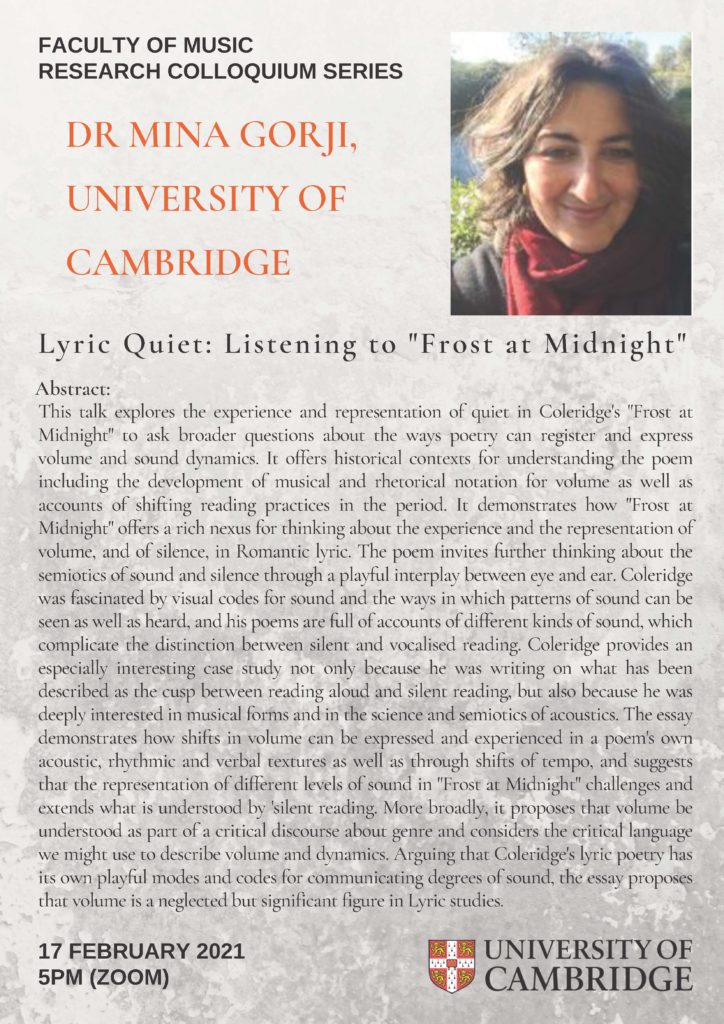 This talk explores the experience and representation of quiet in Coleridge’s “Frost at Midnight” to ask broader questions about the ways poetry can register and express volume and sound dynamics. It offers historical contexts for understanding the poem including the development of musical and rhetorical notation for volume as well as accounts of shifting reading practices in the period. It demonstrates how “Frost at Midnight” offers a rich nexus for thinking about the experience and the representation of volume, and of silence, in Romantic lyric. The poem invites further thinking about the semiotics of sound and silence through a playful interplay between eye and ear. Coleridge was fascinated by visual codes for sound and the ways in which patterns of sound can be seen as well as heard, and his poems are full of accounts of different kinds of sound, which complicate the distinction between silent and vocalised reading. Coleridge provides an especially interesting case study not only because he was writing on what has been described as the cusp between reading aloud and silent reading, but also because he was deeply interested in musical forms and in the science and semiotics of acoustics. The essay demonstrates how shifts in volume can be expressed and experienced in a poem’s own acoustic, rhythmic and verbal textures as well as through shifts of tempo, and suggests that the representation of different levels of sound in “Frost at Midnight” challenges and extends what is understood by ‘silent’ reading. More broadly, it proposes that volume be understood as part of a critical discourse about genre and considers the critical language we might use to describe volume and dynamics. Arguing that Coleridge’s lyric poetry has its own playful modes and codes for communicating degrees of sound, the essay proposes that volume is a neglected but significant figure in Lyric studies.
This talk explores the experience and representation of quiet in Coleridge’s “Frost at Midnight” to ask broader questions about the ways poetry can register and express volume and sound dynamics. It offers historical contexts for understanding the poem including the development of musical and rhetorical notation for volume as well as accounts of shifting reading practices in the period. It demonstrates how “Frost at Midnight” offers a rich nexus for thinking about the experience and the representation of volume, and of silence, in Romantic lyric. The poem invites further thinking about the semiotics of sound and silence through a playful interplay between eye and ear. Coleridge was fascinated by visual codes for sound and the ways in which patterns of sound can be seen as well as heard, and his poems are full of accounts of different kinds of sound, which complicate the distinction between silent and vocalised reading. Coleridge provides an especially interesting case study not only because he was writing on what has been described as the cusp between reading aloud and silent reading, but also because he was deeply interested in musical forms and in the science and semiotics of acoustics. The essay demonstrates how shifts in volume can be expressed and experienced in a poem’s own acoustic, rhythmic and verbal textures as well as through shifts of tempo, and suggests that the representation of different levels of sound in “Frost at Midnight” challenges and extends what is understood by ‘silent’ reading. More broadly, it proposes that volume be understood as part of a critical discourse about genre and considers the critical language we might use to describe volume and dynamics. Arguing that Coleridge’s lyric poetry has its own playful modes and codes for communicating degrees of sound, the essay proposes that volume is a neglected but significant figure in Lyric studies.
Mina Gorji is a senior lecturer in the English faculty
at the University of Cambridge and a fellow of Pembroke College. She
specialises in poetry of the Romantic period and has written a study of
John Clare’s poetry as well as numerous essays on poetry and poetics,
spanning a wide range of subjects and including weeds, awkwardness,
un-situatedness and mess. She is co-director of the Centre for John
Clare Studies, Cambridge and co-convenor of the CRASSH Auralities
research group. She is currently writing a book on poetry and listening
in the Romantic period, ‘Romantic Listening’ and a collection of essays/
reflections on listening to the natural world, ‘Listening for Stars’.
She is also a practising poet and has been published in magazines and
journals as well as The Forward Poetry Anthology (2020) and Bloodaxe’s
Staying Human (2020). Her debut collection, ‘art of escape’, was
published in January 2020 by Carcanet.
For the Zoom link, email: fom.colloquia@mus.cam.ac.uk
